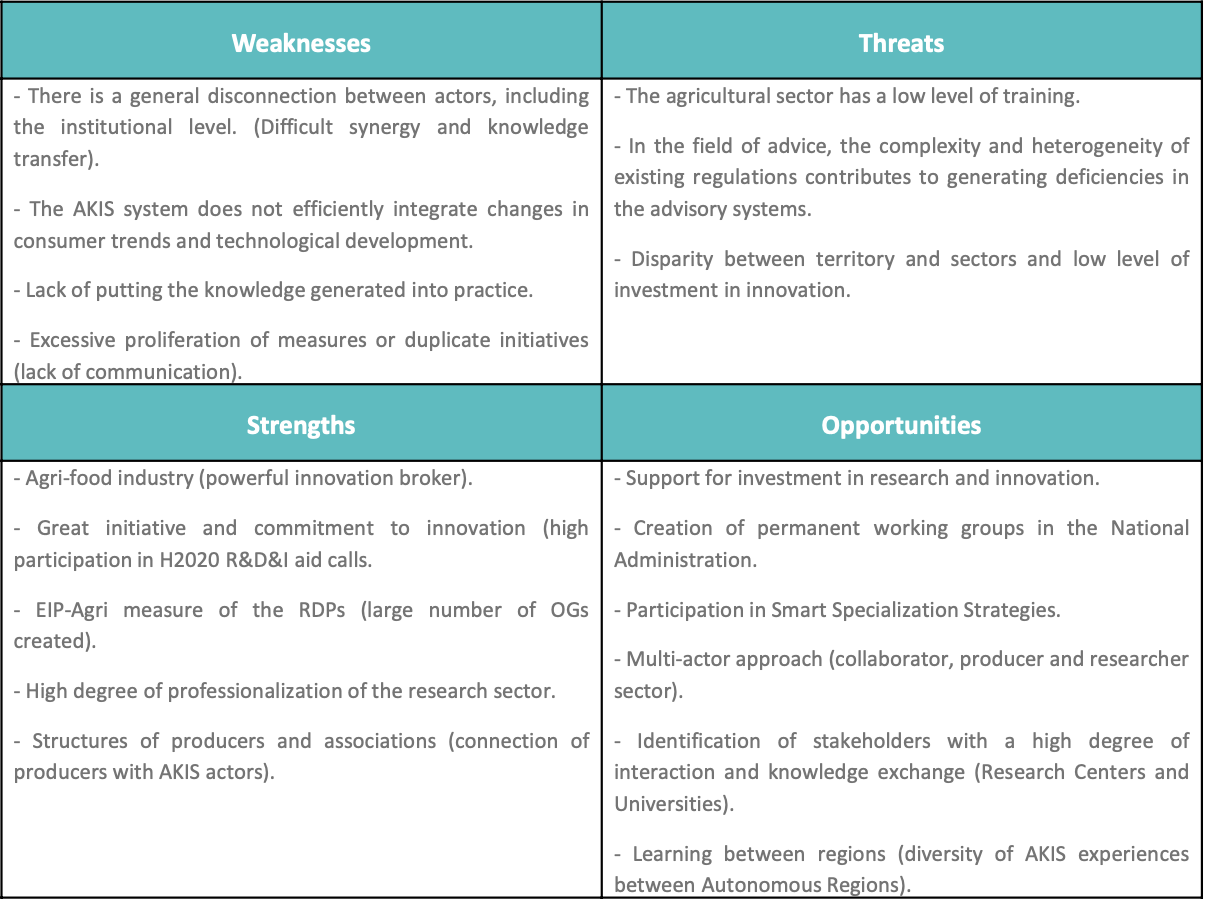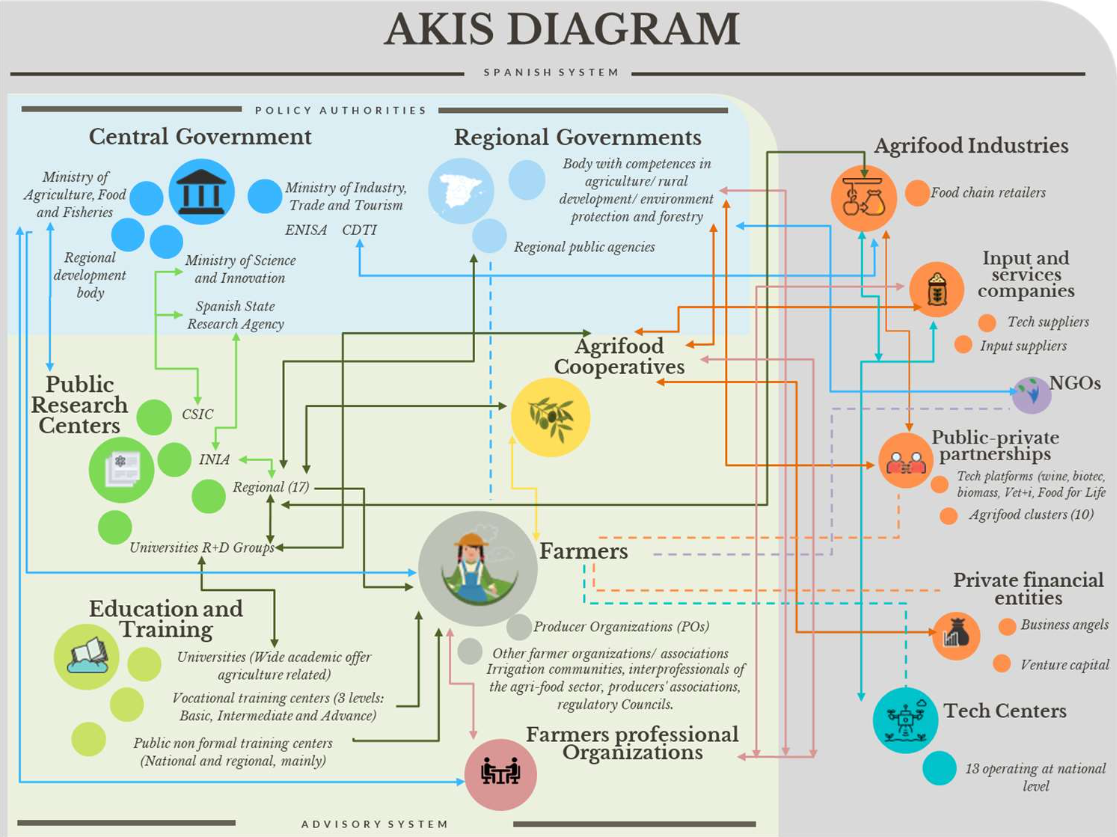AKIS context
The current political and territorial organization of Spain (based on Spanish Constitution), shape a decentralized system in which the regions (NUTS-2 according to Eurostat) have much of the responsibilities and decision-making powers.
On the one hand, the Spanish Constitution establishes that the regions may assume competences in the promotion of research, however the central government has exclusive competences in the promotion and general coordination of scientific and technical research, as well as international –scientific- relations. And on the other hand, all regions have established, in their Statutes of Autonomy (the main legal reference in each region) the assumption of competences in the field of agricultural research.
As soon as it is finished the public participation procedure for the royal decree of the Spanish AKIS Coordination Body. Finally, it will be published in the Official State Gazette (www.boe.es).
Figure 1: Spanish AKIS SWOT analysis

Figure 2: Spanish AKIS Diagram

Source: i2connect AKIS cuntry report (2020). In course of updating
Actor’s categories are represented in circles. Under one category, there are several actors (e.g. Education and training). Impartial agricultural advisory system includes some of the relevant AKIS actor’s categories (green box). The lines represent the linkages between AKIS actors (dashed lines for weak linkages, and solid lines for strong linkages).
Rationale
The political relevance given to AKIS strategies in the context of the CAP Strategic Plans (SPs) 2023-2027 has certainly highlighted the opportunity of defining governance bodies aimed at coordinating the AKIS- relating interventions and actors in view of their better implementation and contribution to the cross- cutting and specific objectives of the CAP SPs.
Particularly, the AKIS coordination body is indicated by the CAP SP 2023-2027 as a point of contact of the European Commission and of the European CAP Network.
The lack of a clear definition of role and functions of the institute of the AKIS coordination bodies by the EU regulation has certainly favored the managing authorities of the CAP SPs in identifying the configurations that best fit the needs for governance of the AKISs and the expectations of the respective actors.
In the case of Spain, the establishment of the AKIS coordination body addressed the specific problem/opportunity of AKIS CAP interventions.
In practice...
1. Who is the AKIS CB
The Spanish AKIS Coordination Body is under development, and it is set up with the presidency of the Ministry of Agriculture and the Ministry of Science. The Spanish AKIS Coordinating Body will function in plenary or in Institutional Commission. The AKIS coordination body includes 3 working groups.
2. Composition of the AKIS CB
The AKIS coordination body encompasses the following types of actors:
1. Public Authorities.
2. Research and Education
2.1. Education and agricultural training.
- Higher education.
- Vocational training.
2.2. Research
3. Private sector
3.1. Agrifood industries
3.2. Input and services companies
3.3. Public-private partnerships
- Tech platforms
- Agrifood clusters or Innovative Enterprise Clusters (IEC)
3.4. Private financial entities
4. Farmer based organization
4.1. Agri food cooperatives
4.2. Farmers professional organizations (FPO)
4.3. Other farmers and forester organizations
5. Non-Governmental Organizations (NGO).
3. Functions attributed to the AKIS CB
The operational responsibilities of the AKIS CB are:
- 1. Collect needs from the actors of the agri-food sector that use knowledge with the aim of channeling it towards actors that generate it or institutions that finance public policies of R&I, both nationally and regionally, through the Spanish Strategy of Science, Technology and Innovation and the corresponding associated plans of the General Administration of the State and the autonomous communities.
- Promote strategies and efforts in innovation of the General State Administration and the autonomous communities in the agri-food sector to optimize efficiency in the use of resources and their impact, in order to promote the transformation of the agri-food sector towards competitive and sustainable production models.
- Promote joint actions between autonomous communities, or between them and the General State Administration, to promote synergies in research programs and projects, with the shared objective of avoiding overlaps and sharing good practices.
- Promote the integration of research staff in activities related to knowledge transfer, demonstration events, thematic networks, technical conferences for the exchange of knowledge and good practices, among others.
- Share information, statistics and comparable data on the situation of counselling in Spain.
- Promote the identification of good practices for the provision of agricultural advisory services, with the aim of increasing their quality.
- Ensure compliance with the obligations laid down in Article 15(2), (3) and (4) of Regulation 2021/2115 of the European Parliament and of the Council of 2 December 2021 laying down rules on support for strategic plans to be drawn up by Member States under the common agricultural policy (CAP Strategic Plans), financed by the European Agricultural Guarantee Fund (EAGF) and the European Agricultural Fund for Rural Development (EAFRD) and repealing Regulations (EU) No 1305/2013 and (EU) No 1307/2013.
- Provide the necessary support for the autonomous communities, competent in advice, to facilitate and validate the list of advisory entities or advisors active in their territories that comply with the provisions derived from article 15 of Regulation 2021/2115 of the European Parliament and of the Council of December 2, 2021 and integrate this information into the AKIS Consulting Professionals Platform that will be launched by the Ministry of Agriculture, Fisheries and Food as a support tool for the promotion of the integration of advisors in the Agricultural Knowledge and Innovation System in Spain, as well as to strengthen the interrelation of the different actors of the same.
- Analyze the needs and opportunities in terms of training for advisors in the agri-food sector.
- Facilitate the exchange of information and collaboration with the autonomous communities and professional organizations of the sector, about the demands and training opportunities for professionals in the agri-food sector.
- Promote and disseminate initiatives to promote the acquisition of professional skills in the agri-food sector.
- Promote the recognition of professional skills acquired through work experience of workers in the agri-food sector.
- Monitor the implementation of innovation, knowledge transfer and advice interventions, both at national and regional level, analyzing the substantial modifications of the CAP Strategic Plan on these areas when they occur.
- Promote a culture of evaluation in the Agricultural Knowledge and Innovation System.
- Promote synergies in terms of dissemination of knowledge transfer and innovation in the agri-food sector between the R + D + i Policy Network and the CAP Network.
- Promote good practices in the dissemination of innovation actions, knowledge transfer and advice so that they are properly captured within the CAP Network.
- Propose, once the National PAC Network has been established, with the temporality and periodicity to be determined, an Action Plan (events, conferences, studies, tools) in the field of innovation and knowledge transfer for its transfer and subsequent execution in the National PAC Network.
- Provide relevant information to the AKIS Advisors Platform, which will act as an open platform for the exchange and dissemination of knowledge generated in the scientific and academic field in a simple and understandable language by other actors of the Agricultural Knowledge and Innovation System and in an interoperable format, such as:
a) new knowledge or innovations generated in the field of intervention (regional or supra-autonomic) cooperation within the framework of the European Innovation Partnership for Agricultural Productivity and Sustainability, known as EIP-Agri (Articles 77 and 127 of Regulation 2021/2115 of the European Parliament and of the Council of 2 December 2021), Horizon Europe, State Plan of R + D + i, Complementary Plans of R + D + i, or Regional Plans of R + D + i.
b) Events of interest.
c)Training of advisors.
- Report its conclusions to the Sectoral Commission of Agriculture, Food and Rural Development and to the Delegate Commission of the Council of Scientific, Technological and Innovation Policy.
- Identify information gaps regarding the situation of agri-food R+D+I, contributing to the adequate reflection in the SICTI (Information System on Science, Technology and Innovation) of the financing flows of agri-food innovation from the Common Agricultural Policy.
- Ensure that there is a key vision of the agri-food sector of the credits allocated annually to projects and actions of R + D + I within the framework of the State Plan for Scientific and Technical Research and Innovation.
4. Procedures for interplaying with other AKIS actors and with the MA of the CAP SP
The regulatory procedure is governed by the regulations that the AKIS CB will develop normatively and the administrative law rules applicable to collegiate bodies.
However, it is necessary to create and specify the informal communication procedure between the different members of the AKIS CB, in order to allow an efficient knowledge flow and exchange.
It is already established that operational activities will be performed by annual meetings.
Practical implications for replicability
This configuration of AKIS CB can only be replicated in decentralized countries in which the regions have a high level of competencies.
Fragmentation and decentralization of AKIS in Spain, should not represent a weakness, what's more, with adequate mechanisms of coordination, and involvement of the different actors, at different levels (regional and national), will allow reinforcing the AKIS and the generation of synergies between the territories.
In terms of their replicability, there are different options for the design of a possible governance structure that must be governed by three main principles:
- Be simple and adapted to reality and level of development of a decentralized country.
- Be operational.
- Respect the powers of each area and reinforce the AKIS CB through a reinforced cooperation.
And that, in turn, must be oriented to work in four areas:
- Coordination.
- Exchange of experiences.
- Identification of good practices.
- Monitoring, evaluation and proposal of corrective actions.
Finally for a well functioning and division of the roles it might be important to define them in a formal act.
Benefits
- A collegial body with a well represented AKIS (both at national and regional level) allows a better capturing of the needs and priorities;
- Establishment of common elements of execution of AKIS actions more complex (advice and cooperation) avoiding distortions between regions and public entities.
- From the development of synergies and complementarities with other funds and actions developed by other departments to strengthen the AKIS.
- Well defined functions and roles at regulatory level give a stronger impulse to the AKIS CB mandate
- Monitoring supported by indicators that are agree, in a way that allows the evaluation of achieving objectives and identifying possible corrective actions.
Watch this AKIS-in-Practice!
https://www.youtube.com/playlist?list=PLMSSGZC_T3nc3PJCkzwneCo1-qYu8P0v5
Further information


